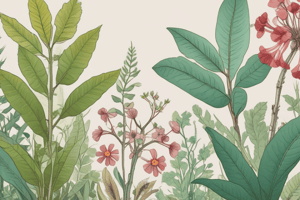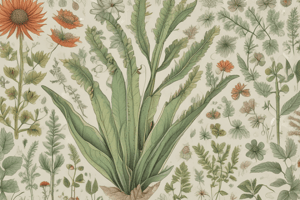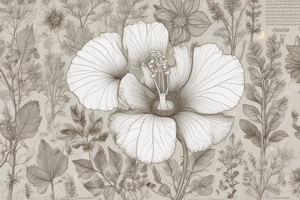Podcast
Questions and Answers
Plant organs are made up of tissues that perform similar functions.
Plant organs are made up of tissues that perform similar functions.
True (A)
The shoot system of a plant includes the leaves, stems, and flowers.
The shoot system of a plant includes the leaves, stems, and flowers.
True (A)
The root system of a plant is connected to the shoot system by vascular tissues.
The root system of a plant is connected to the shoot system by vascular tissues.
True (A)
Fibrous roots are commonly found in monocotyledonous plants.
Fibrous roots are commonly found in monocotyledonous plants.
Root hairs are extensions of root epidermal cells that increase the absorptive surface area of the root.
Root hairs are extensions of root epidermal cells that increase the absorptive surface area of the root.
Prop roots are aerial roots that perform photosynthesis.
Prop roots are aerial roots that perform photosynthesis.
Primary growth is responsible for growth in width.
Primary growth is responsible for growth in width.
The vascular cambium adds layers of secondary xylem and secondary phloem.
The vascular cambium adds layers of secondary xylem and secondary phloem.
The cork cambium replaces the epidermis with periderm.
The cork cambium replaces the epidermis with periderm.
Intercalary meristems are found in the vicinity of nodes and add to stem length.
Intercalary meristems are found in the vicinity of nodes and add to stem length.
Primary growth leads to lengthening of roots and shoots.
Primary growth leads to lengthening of roots and shoots.
The region of cell division is composed of apical meristem in the center of the root tip.
The region of cell division is composed of apical meristem in the center of the root tip.
True or false: Air roots are found on mangroves in swamps and allow roots to obtain oxygen above the water line?
True or false: Air roots are found on mangroves in swamps and allow roots to obtain oxygen above the water line?
True or false: Contractile roots pull plants deeper into the soil?
True or false: Contractile roots pull plants deeper into the soil?
True or false: Buttress roots provide stability in shallow soils?
True or false: Buttress roots provide stability in shallow soils?
True or false: Pneumatophores are present in prop roots?
True or false: Pneumatophores are present in prop roots?
True or false: Stolons are produced above the surface of the ground?
True or false: Stolons are produced above the surface of the ground?
True or false: Tubers are swollen, fleshy underground stems that store food?
True or false: Tubers are swollen, fleshy underground stems that store food?
Lateral meristems are typically found in monocots.
Lateral meristems are typically found in monocots.
Secondary growth occurs in stems and roots of woody plants.
Secondary growth occurs in stems and roots of woody plants.
The vascular cambium adds secondary xylem and phloem.
The vascular cambium adds secondary xylem and phloem.
The cork cambium produces tough, thick, waxy covered cells.
The cork cambium produces tough, thick, waxy covered cells.
The oldest rings of secondary xylem stop conducting water and minerals.
The oldest rings of secondary xylem stop conducting water and minerals.
The periderm is impermeable to water and gases.
The periderm is impermeable to water and gases.
Onions and lily have reproductive leaves that walk?
Onions and lily have reproductive leaves that walk?
Poinsettia flowers have brightly colored bracts instead of petals?
Poinsettia flowers have brightly colored bracts instead of petals?
Pitcher plants trap and digest insects inside their cone-shaped leaves?
Pitcher plants trap and digest insects inside their cone-shaped leaves?
Dermal tissue is the outer protective covering of plants?
Dermal tissue is the outer protective covering of plants?
Xylem is responsible for the conduction of sugar downward from shoot to root?
Xylem is responsible for the conduction of sugar downward from shoot to root?
Parenchyma cells have thick secondary walls and function in support?
Parenchyma cells have thick secondary walls and function in support?
Flashcards are hidden until you start studying
Study Notes
Plant Organs and Tissues
- Plant organs are composed of tissues that perform similar functions.
- The shoot system consists of leaves, stems, and flowers, while the root system is connected to the shoot system by vascular tissues.
Root System
- Fibrous roots are commonly found in monocotyledonous plants.
- Root hairs are extensions of root epidermal cells that increase the absorptive surface area of the root.
- Prop roots are aerial roots that perform photosynthesis.
Growth and Development
- Primary growth is responsible for growth in width.
- The vascular cambium adds layers of secondary xylem and secondary phloem.
- The cork cambium replaces the epidermis with periderm.
- Intercalary meristems are found in the vicinity of nodes and add to stem length.
- Primary growth leads to lengthening of roots and shoots.
Types of Roots
- Air roots are found on mangroves in swamps and allow roots to obtain oxygen above the water line.
- Contractile roots pull plants deeper into the soil.
- Buttress roots provide stability in shallow soils.
- Pneumatophores are present in prop roots.
Stem and Root Development
- Lateral meristems are typically found in monocots.
- Secondary growth occurs in stems and roots of woody plants.
- The vascular cambium adds secondary xylem and phloem.
- The cork cambium produces tough, thick, waxy covered cells.
Plant Anatomy
- The oldest rings of secondary xylem stop conducting water and minerals.
- The periderm is impermeable to water and gases.
- Dermal tissue is the outer protective covering of plants.
- Parenchyma cells have thin primary walls and function in storage and photosynthesis.
Miscellaneous Plant Facts
- Poinsettia flowers have brightly colored bracts instead of petals.
- Pitcher plants trap and digest insects inside their cone-shaped leaves.
- Tubers are swollen, fleshy underground stems that store food.
- Stolons are produced above the surface of the ground.
Studying That Suits You
Use AI to generate personalized quizzes and flashcards to suit your learning preferences.




